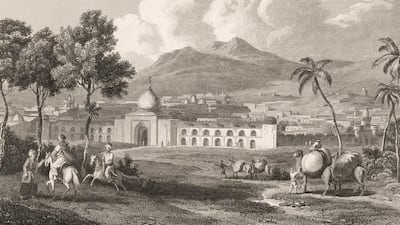The world stands at a dangerous moment: tensions in Eastern Europe, war in Syria, the rise of militant Islamists and recent hostilities in Gaza.
In the face of this, the argument that the West, and America in particular, is in decline has been put forward as one of the contributing reasons for this turmoil. But is decline inevitable and what lessons can be learnt from history?
This is the subject of a talk at New York University Abu Dhabi (NYUAD) on Sunday on the decline and fall of the Safavid empire - a powerful Persian dynasty that was the forerunner of the modern Iranian state. At one point, the empire stretched from the Caucasus to Afghanistan and the Safavids were one of the "gunpowder" empires, along with the Mughals and Ottomans.
"The Safavids were significant because they declared Shia as the state religion, which endures to this day. Sunnis in Iraq still tend to call Shias the Safavids," says Professor Rudi Matthee, who will deliver the lecture. "They were not as powerful as the Ottomans but it was very sophisticated and well-run."
Over the past months, the extremist group ISIL has rampaged through parts of Iraq and Syria, expelling minorities and often killing them. According to Matthee, this stands in direct contrast to the Safavids, whose treatment of minorities was an important part of their success.
"There was a clear hierarchy. Islam was on top, but Jews, and especially Armenians, were relatively well-treated. As the nature of the state became more Shia, persecution of minorities went up, but by and large there is a great deal of toleration.
"If you want to run an empire, the best possible way is to have unity through diversity. You don't chop off heads, you bring people in, you invite them to convert. If they don't, well, God will take care of that but in the meantime, they pay higher taxes."
The lecture is part of a broader two-day workshop examining the Muslim world in the 18th century on the eve of European colonialism.
According to Justin Stearns, assistant professor in Arab crossroads studies at NYUAD, and the organiser of the event, many people understand the Muslim world at this time to be in decline and both events seek to question this. "It will try to challenge the fact there is nothing interesting happening in the Muslim word and what the empire means for Muslims [today], especially Iranians. Some look back and think, what if things had gone a different way," says Stearns.
"There is this narrative of decline, a narrative of stasis strongly present in people's understanding - both Muslim and non-Muslim, Middle Eastern, westerner - of the Muslim world on the eve of colonialism. That's what we are trying to question."
The Safavid empire collapsed in the 18th century and the reasons for this are complex. It's a mix, says Matthee. "The shah retreats and becomes less visible. They effectively give up war and an army that does that gets rusty. They give up war against the Ottomans and are unable to combat the nomadic invaders from the east."
But the legacy lives on in the state that exists today and also in the culture of the Safavids - literature, architecture, art and poetry, seen particularly in Isfahan, a capital of the empire for a period.
"It was the last time Iran stood tall and was a proud independent country before the coming of the westerners, the imperialists. They look back through the lens of glory at Isfahan. Its beautiful square, its mosques, its aura that is still visible today," says Matthee, a professor of history at the University of Delaware in the United States.
However, as is so often the case, there's also a warning from history. One of the reasons for the Safavids' success was its harnessing of minorities - something that could be in danger of evaporating today. "The hardening of religious sentiment towards the end did come at the expense of minorities and more importantly, Sunnis. There is a lesson there for the Islamic republic," says Matthee.
"Don't oppress minorities or it will come back and haunt you. That's exactly what happened with the Safavids - the tribal fringe, mostly Sunnis, were alienated and they paid back by revolting. At this point the Safavids were no longer militarily capable and that led to the collapse of the state.
"Look at the Chinese today. It's a diverse land and they are oppressing their fringes and, in some way, are running the same risk," he says.
"The British Empire declined. The Americans are now supposedly in decline. If you want to run an empire, there is a toolkit. It's a balancing act. The Safavids gave up on the smart way of doing that and there is a lesson there for empires in general."
The Decline and Fall of the Safavid Empire is at NYUAD on September 14 from 6.30pm to 8pm and is open to the public.
John Dennehy is deputy editor of The Review.
jdennehy@thenational.ae

A decline and fall: what the history of the Safavid Empire can teach us
The reasons for the end of a powerful Persian dynasty that was the forerunner of the modern Iranian state has lessons for today.
Most popular today

